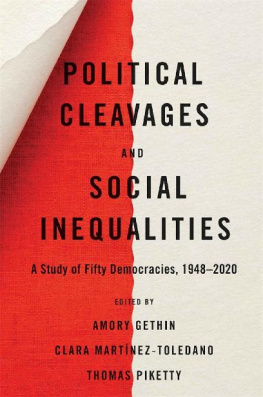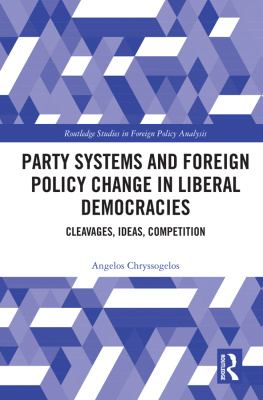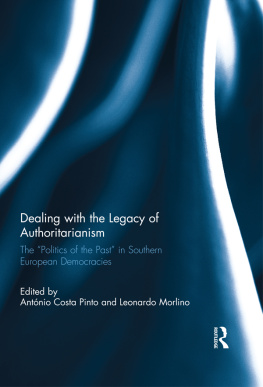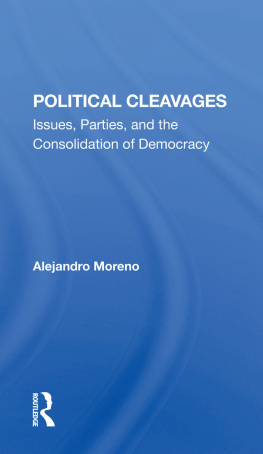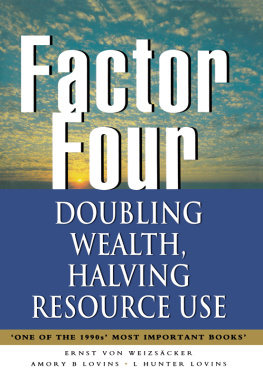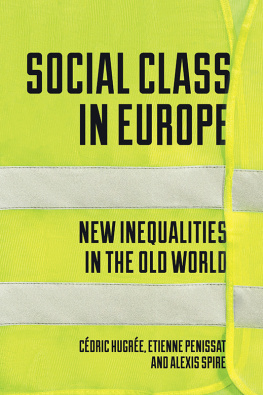Amory Gethin - Political Cleavages and Social Inequalities: A Study of Fifty Democracies, 1948–2020
Here you can read online Amory Gethin - Political Cleavages and Social Inequalities: A Study of Fifty Democracies, 1948–2020 full text of the book (entire story) in english for free. Download pdf and epub, get meaning, cover and reviews about this ebook. year: 2021, publisher: Harvard University Press, genre: Politics. Description of the work, (preface) as well as reviews are available. Best literature library LitArk.com created for fans of good reading and offers a wide selection of genres:
Romance novel
Science fiction
Adventure
Detective
Science
History
Home and family
Prose
Art
Politics
Computer
Non-fiction
Religion
Business
Children
Humor
Choose a favorite category and find really read worthwhile books. Enjoy immersion in the world of imagination, feel the emotions of the characters or learn something new for yourself, make an fascinating discovery.
- Book:Political Cleavages and Social Inequalities: A Study of Fifty Democracies, 1948–2020
- Author:
- Publisher:Harvard University Press
- Genre:
- Year:2021
- Rating:3 / 5
- Favourites:Add to favourites
- Your mark:
- 60
- 1
- 2
- 3
- 4
- 5
Political Cleavages and Social Inequalities: A Study of Fifty Democracies, 1948–2020: summary, description and annotation
We offer to read an annotation, description, summary or preface (depends on what the author of the book "Political Cleavages and Social Inequalities: A Study of Fifty Democracies, 1948–2020" wrote himself). If you haven't found the necessary information about the book — write in the comments, we will try to find it.
Amory Gethin: author's other books
Who wrote Political Cleavages and Social Inequalities: A Study of Fifty Democracies, 1948–2020? Find out the surname, the name of the author of the book and a list of all author's works by series.
Political Cleavages and Social Inequalities: A Study of Fifty Democracies, 1948–2020 — read online for free the complete book (whole text) full work
Below is the text of the book, divided by pages. System saving the place of the last page read, allows you to conveniently read the book "Political Cleavages and Social Inequalities: A Study of Fifty Democracies, 1948–2020" online for free, without having to search again every time where you left off. Put a bookmark, and you can go to the page where you finished reading at any time.
Font size:
Interval:
Bookmark:
POLITICAL CLEAVAGES AND SOCIAL INEQUALITIES

A Study of Fifty Democracies, 19482020
AMORY GETHIN
CLARA MARTNEZ-TOLEDANO
THOMAS PIKETTY
Harvard University Press
Cambridge, Massachusetts London, England 2021
Copyright 2021 by the President and Fellows of Harvard College
All rights reserved
Cover design by Graciela Galup
Cover background images: Getty; royalty-free
978-0-674-24842-7 (cloth)
978-0-674-26992-7 (EPUB)
978-0-674-26991-0 (PDF)
First published in French as Clivages politiques et ingalits sociales. Une tude de 50 dmocraties (19482020) (Paris: Les ditions du Seuil, 2021).
The Library of Congress has cataloged the printed edition as follows:
Names: Gethin, Amory, 1995 author. | Martnez-Toledano, Clara, 1990 author. | Piketty, Thomas, 1971 author.
Title: Political cleavages and social inequalities : a study of fifty democracies, 19482020 / Amory Gethin, Clara Martnez-Toledano, Thomas Piketty.
Other titles: Clivages politiques et ingalits sociales. English
Description: Cambridge, Massachusetts : Harvard University Press, 2021. | First published in French as Clivages politiques et ingalits sociales. Une tude de 50 dmocraties (19482020) (Paris: Les ditions du Seuil, 2021). | Includes bibliographical references and index.
Identifiers: LCCN 2021012242
Subjects: LCSH: Party affiliationHistory20th century. | Party affiliationHistory21st century. | EqualityPolitical aspectsHistory20th century. | EqualityPolitical aspectsHistory21st century. | Politics, PracticalHistory20th century. | Politics, PracticalHistory21st century. | DemocracyHistory20th century. | DemocracyHistory21st century.
Classification: LCC JF2071 .G4813 2021 | DDC 306.209 / 045dc23
LC record available at https://lccn.loc.gov/2021012242
- A. GETHIN, C. MARTNEZ-TOLEDANO, AND T. PIKETTY
- A. GETHIN, C. MARTNEZ-TOLEDANO, AND T. PIKETTY
- T. PIKETTY
- F. KOSSE AND T. PIKETTY
- C. MARTNEZ-TOLEDANO AND A. SODANO
- A. GETHIN
- L. BAULUZ, A. GETHIN, C. MARTNEZ-TOLEDANO, AND M. MORGAN
- C. DURRER DE LA SOTA, A. GETHIN, AND C. MARTNEZ-TOLEDANO
- A. LINDNER, F. NOVOKMET, T. PIKETTY, AND T. ZAWISZA
- A. BANERJEE, A. GETHIN, AND T. PIKETTY
- A. GETHIN, S. MEHMOOD, AND T. PIKETTY
- A. GETHIN
- A. GETHIN AND T. JENMANA
- C. DURRER DE LA SOTA AND A. GETHIN
- A. GETHIN AND M. MORGAN
- O. BARRERA, A. LEIVA, C. MARTNEZ-TOLEDANO, AND A. ZIGA-CORDERO
- A. GETHIN
- J. BALEYTE, A. GETHIN, Y. GOVIND, AND T. PIKETTY
- Y. BERMAN
- L. ASSOUAD, A. GETHIN, T. PIKETTY, AND J. URAZ
- A. GETHIN, C. MARTNEZ-TOLEDANO, AND T. PIKETTY
AMORY GETHIN, CLARA MARTNEZ-TOLEDANO, AND THOMAS PIKETTY
This volume presents the results of a collective research program on the structure of political cleavages and social inequalities in fifty electoral democracies, located on the five continents, from 1948 to 2020. The purpose of this introduction is to succinctly describe the programs objectives and methods, as well as to briefly outline the organization of the volume and its different chapters.
Electoral democracies: this notion must immediately be clarified so as to circumscribe our object of enquiry. None of the countries studied in this book are perfect democracies, far from it, and some of them notably depart from being so, in particular when it comes to freedom of the press or to neutrality of the state in organizing electoral operations. All these countries, however, have at some point held plural and disputed elections, in the sense that the results were not entirely known in advance and could have determined access to political power. For our purpose, these elections allow us to study how different social groups have decided to cast their votes for existing parties and coalitions, thereby offering an imperfect yet tangible window on citizens beliefs, their political and ideological visions, and the electoral choices that derive from them, given the limited options they face.
Such is, above all, the central objective of this volume: the study in a systematic manner of how electoral choices vary according to social attributes such as income, education, wealth, occupation, gender, age, national origin, or ethnoreligious identity. To do so, we have relied on a quasi-unique source: electoral surveys conducted in a number of countries that have organized plural elections since the end of World War II. These surveys, carried out on representative samples of generally a few thousand voters, most often in the days or weeks following the corresponding election, have collected information on both respondents electoral behaviors and their socioeconomic characteristics. In spite of their imperfections, they constitute one of the most precious sources at our disposal for studying the relationships between the structures of political cleavages and social inequalities.
Thanks to the collaboration of about twenty researchers participating to this project, we have been able to assemble and exploit on a homogeneous and comparable basis nearly all electoral surveys conducted in fifty electoral democracies throughout the world from 1948 to 2020. This has allowed us to establish a global and historical mapping of the ways by which different dimensions of social inequalities are or are not, within a given party or coalition, subject to common political mobilizations.
Among the numerous questions that we have attempted to tackle is the following: to what extent are voters from underprivileged backgroundswhether in terms of income, education, or wealthprone to support a common electoral bloc, independent of their other characteristics such as national or regional origin or ethnoreligious identity? In other words, what is the relative importance of class-based and identity-based factors in structuring political cleavages and determining electoral behaviors? As we shall see, the answers to this question vary considerably across time and space, including within a given country. In practice, these different factors combine in multiple ways, depending on specific historical and political constructions and deconstructions, which should be analyzed as such.
Let us take an example. From the 1950s to the 1980s, the Democratic Party in the United States drew to a large extent the votes of the lower classes, regardless of the criteria adopted to define them (income, education, wealth, or occupation), and independent of their origins or racial affiliations. Over the 20002020 period, by contrast, lower classes belonging to Black or Latino minorities continue to predominantly vote for the Democratic Party, but White lower classes have clearly shifted toward the Republican Party. Another type of fragmentation also seems to have occurred at the top of the social hierarchy: higher-educated voters are now strongly supportive of the Democratic Party, while those with highest levels of wealth (and to a lesser extent those with highest levels of income) continue to support the Republican Party, albeit not as clearly as they used to in the postwar era.
A somewhat comparable transformation seems to have taken place in Europe, where divides related to origins and ethnoreligious identities have recently taken unprecedented importance. As a result, European democracies are now gradually coming closer to the case of the United States, despite extremely different initial configurations, in particular regarding the historically stronger influence of class-based cleavages (and correlatively the weaker influence of racial and ethnoreligious divides) in Europe. On the contrary, we shall see that in other parts of the world, notably in Asia, Latin America, or Africa, the class-based dimension of political conflicts has in some cases intensified in recent decades. These results call into question the Western view that sometimes favors a narrow ethnicist vision of electoral conflicts in non-Western democracies. In reality, it is the West that appears to be undergoing a process of ethnicization and tribalization, at a time where a number of other democracies are moving toward class-based conflicts. These results also and most importantly invite us to take a closer look at the programmatic and politico-ideological platforms allowing specific parties and coalitions to bring together, with varying degrees of success, voters from different origins.
Next pageFont size:
Interval:
Bookmark:
Similar books «Political Cleavages and Social Inequalities: A Study of Fifty Democracies, 1948–2020»
Look at similar books to Political Cleavages and Social Inequalities: A Study of Fifty Democracies, 1948–2020. We have selected literature similar in name and meaning in the hope of providing readers with more options to find new, interesting, not yet read works.
Discussion, reviews of the book Political Cleavages and Social Inequalities: A Study of Fifty Democracies, 1948–2020 and just readers' own opinions. Leave your comments, write what you think about the work, its meaning or the main characters. Specify what exactly you liked and what you didn't like, and why you think so.

